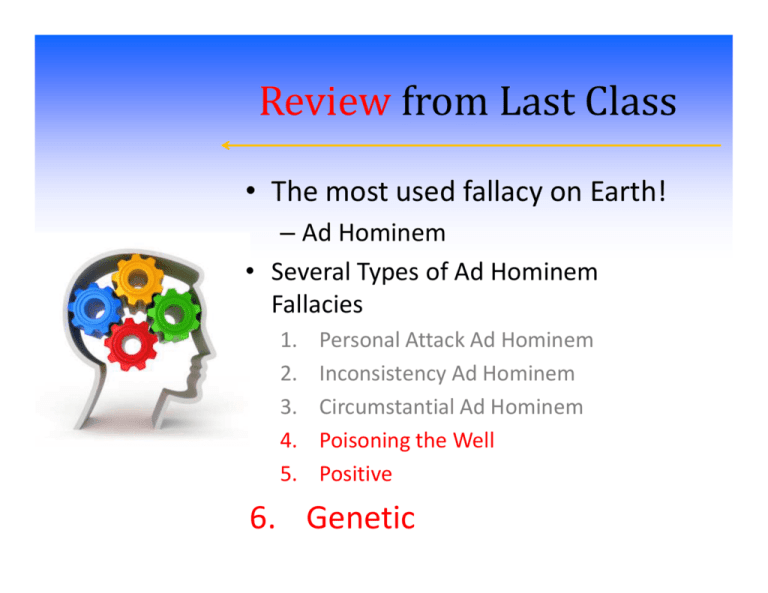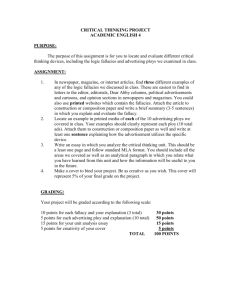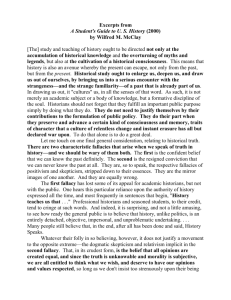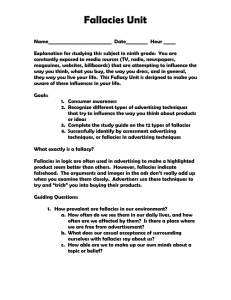Review from Last Class - The Power of Thinking Differently
advertisement

Review from Last Class • The most used fallacy on Earth! – Ad Hominem • Several Types of Ad Hominem Fallacies 1. 2. 3. 4. 5. Personal Attack Ad Hominem Inconsistency Ad Hominem Circumstantial Ad Hominem Poisoning the Well Positive 6. Genetic Review from Last Class Beyond attacking the source… 7. Straw Man “Do I want the police department to take charge of writing parking tickets? You mean, do I want to get shot if I pull up next to a fire hydrant? What do you think?” 8. False Dilemma “Are you kidding me? Either we get another department to write parking tickets or we’ll start getting shot when we pull up to a fire hydrant.” Fallacies #9. False Dilemma – Special Type: Perfectionist Believing something is either perfect or must be rejected. What’s wrong with this reasoning? “It’s impossible to eliminate terrorism entirely. We should stop wasting money on it.” Can you think of (or make up) others? Fallacies #10. False Dilemma – Special Type: Line-Drawing Believing that either there is a precise place to draw a line or there is no line to be drawn. What’s wrong with this reasoning? “ There shouldn’t be restrictions on violence in the movies. After all, when is a movie ‘too violent’? You can’t draw a line.” Can you think of (or make up) others? Fallacies What’s wrong with this argument? “No, I don’t believe in ‘three strikes and you’re out for convicted felons. Next thing it will be two strikes, then one strike. Then we will be sticking people in jail for life for misdemeanors. It’s not good policy.” Issue: Whether three strikes and you’re out is a good policy. Conclusion: No, it’s not. Premise: Three strikes and you’re out will lead to jail for life for misdemeanors. Fallacies #11. Slippery Slope When it is assumed that some event must inevitably follow from some other event. “No, I don’t believe in ‘three strikes and you’re out for convicted felons. Next thing it will be two strikes, then one strike. Then we will be sticking people in jail for life for misdemeanors. It’s not good policy.” Fallacies Where is the Slippery Slope Fallacy? Group Exercise In groups of 3 to 6 Create examples for the following special types of fallacies. (Start with a claim first. Then assign somebody as the proponent of that claim. Then create the fallacy.) • • • • • • Personal Attack Ad Hominem Inconsistency Ad Hominem Circumstantial Ad Hominem Poisoning the Well Ad Hominem Positive Ad Hominem Genetic Group Exercise In groups of 3 to 6 Create examples for the following special types of fallacies. (Start with a claim first. Then create the fallacy.) • • • • • Straw Man False Dilemma Perfectionist Fallacy Line-Drawing Fallacy Slippery Slope Fallacies What’s wrong with this argument? Bill: "I think that Mr. Galindo has psychic powers." Jill: “No way. What’s your proof? Bill: “Can you prove that he doesn’t have psychic powers? Issue: Whether Mr. Galindo have psychic powers. Conclusion: Yes. Mr. Galindo has psychic powers. Premise: ?? Fallacies #12. Misplacing the Burden of Proof When the burden of proof is placed on the wrong side of an issue. (The “why not” or “prove it isn’t true” premise.) So how do we know which side of the issue has the burden of proof? Fallacies So how do we know which side of the issue has the burden of proof? 1. The side that has less initial plausibility. Jim: I think I got a raise today because I have an invisible good luck unicorn living in my bathroom Kate: What? No way. Jim: Hey, can you prove that it’s not true? Fallacies So how do we know which side of the issue has the burden of proof? 2. Affirmative side, if all things are equal. Jane: High school graduates would be (affirmative) better off going straight to work rather than going to college. Marcia: Why? Jane: Prove that they wouldn’t be (negative) better off! Fallacies So how do we know which side of the issue has the burden of proof? 3. Special Circumstances (decided at the outset) Example Criminal Court “Innocent until proven guilty.” Fallacies #13. Misplacing the Burden of Proof – Special Case: Appeal to Ignorance. “We should believe it because nobody has proved it isn’t so.” Example: Bill: "I think that Mr. Galindo has psychic powers." Jill: "What is your proof?" Bill: "No one has been able to prove that he doesn’t have psychic powers." Fallacies What wrong with this argument? Fallacies #14. Begging the Question (circular reasoning) Using premises that already assume the conclusion is true. http://www.colbertnation.com/the-colbert-report-videos/405668/january-10-2012/tip-wag--irresponsible-dead-people---insensitive-papa-john-s https://showyou.com/v/h-9aptNB25Rqx-56wx/tipwag-irresponsible-dead-people-insensitive-papa-johns Interviewer: "Your resume looks impressive but I need another reference.“ Bill: "Jill can give me a good reference.“ Interviewer: "Good. But how do I know that Jill is trustworthy?“ Bill: “That’s easy! I can vouch for her." Group Exercise In groups of 3 to 6 Create examples for the following special types of fallacies. (Start with a claim first. Then assign somebody as the proponent of that claim. Then create the fallacy.) •Personal Attack Ad Hominem •Inconsistency Ad Hominem •Circumstantial Ad Hominem •Poisoning the Well Ad Hominem •Positive Ad Hominem •Genetic Group Exercise In groups of 3 to 6 Create examples for the following special types of fallacies. (Start with a claim first. Then create the fallacy.) •Straw Man •False Dilemma •Perfectionist Fallacy •Line-Drawing Fallacy •Slippery Slope •Misplacing the Burden of Proof •Appeal to Ignorance •Begging the Question Group Exercise 7-3 #2, 3, 4, 6, 9 2. Perfectionist Fallacy 3. False Dilemma 4. Straw Man 6. Poisoning the Well 9. Begging the Question








